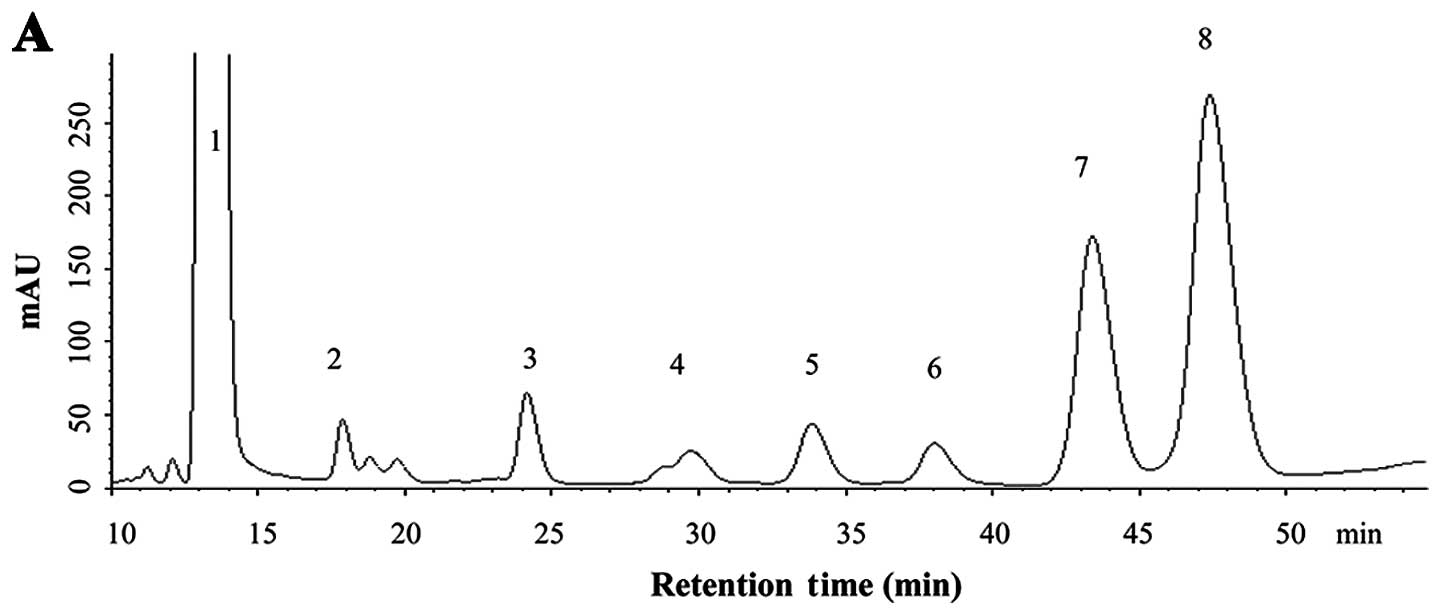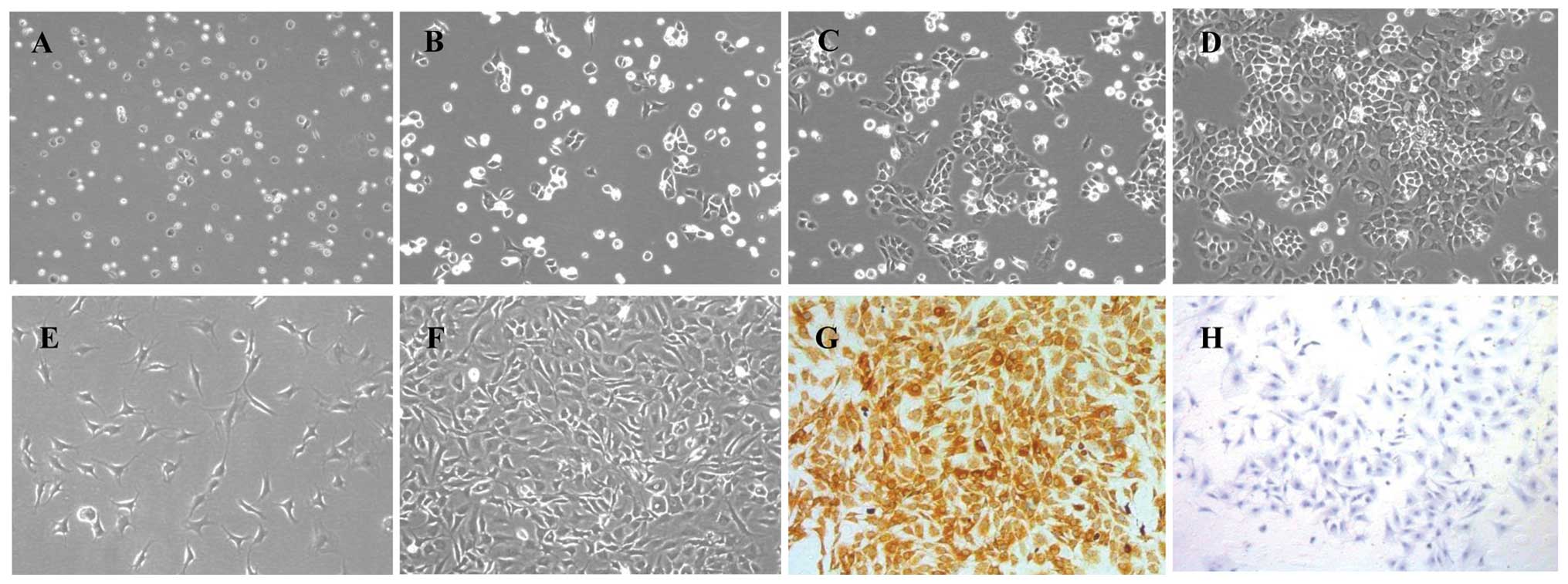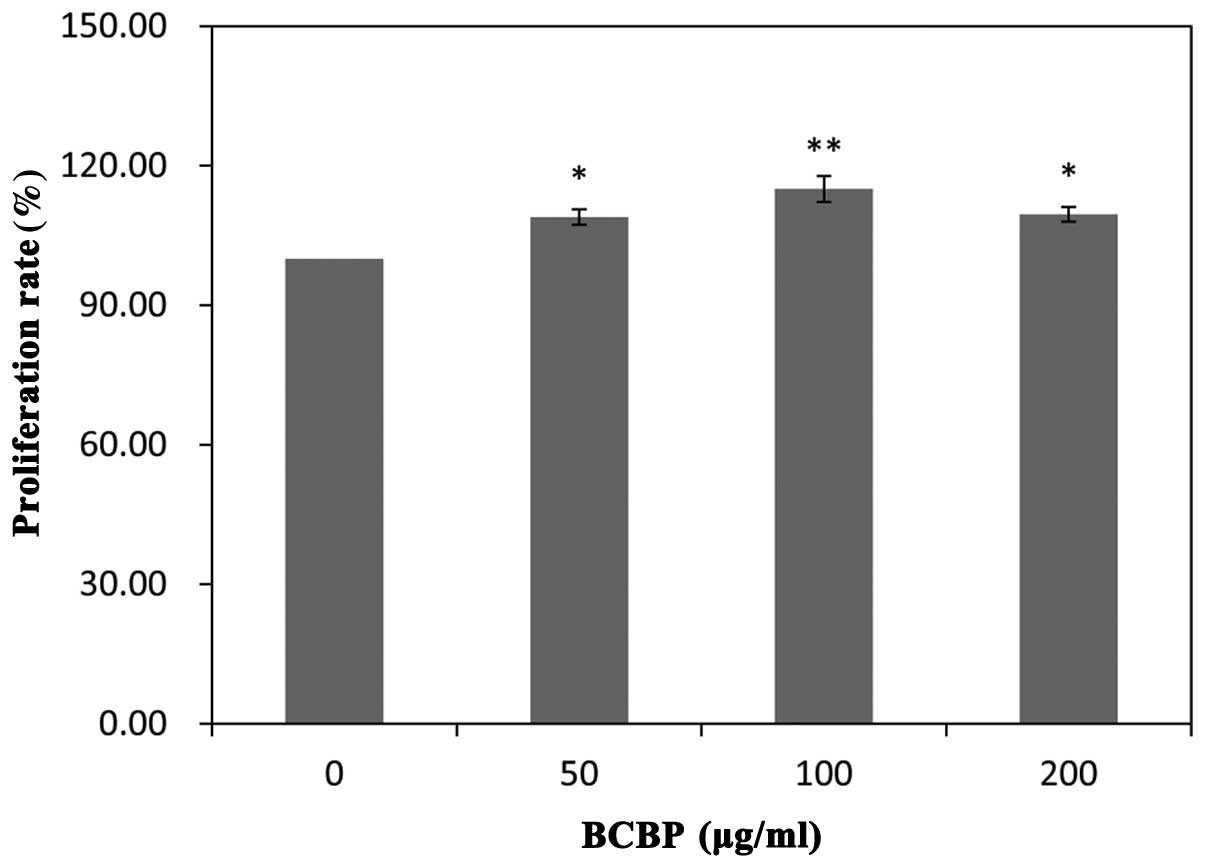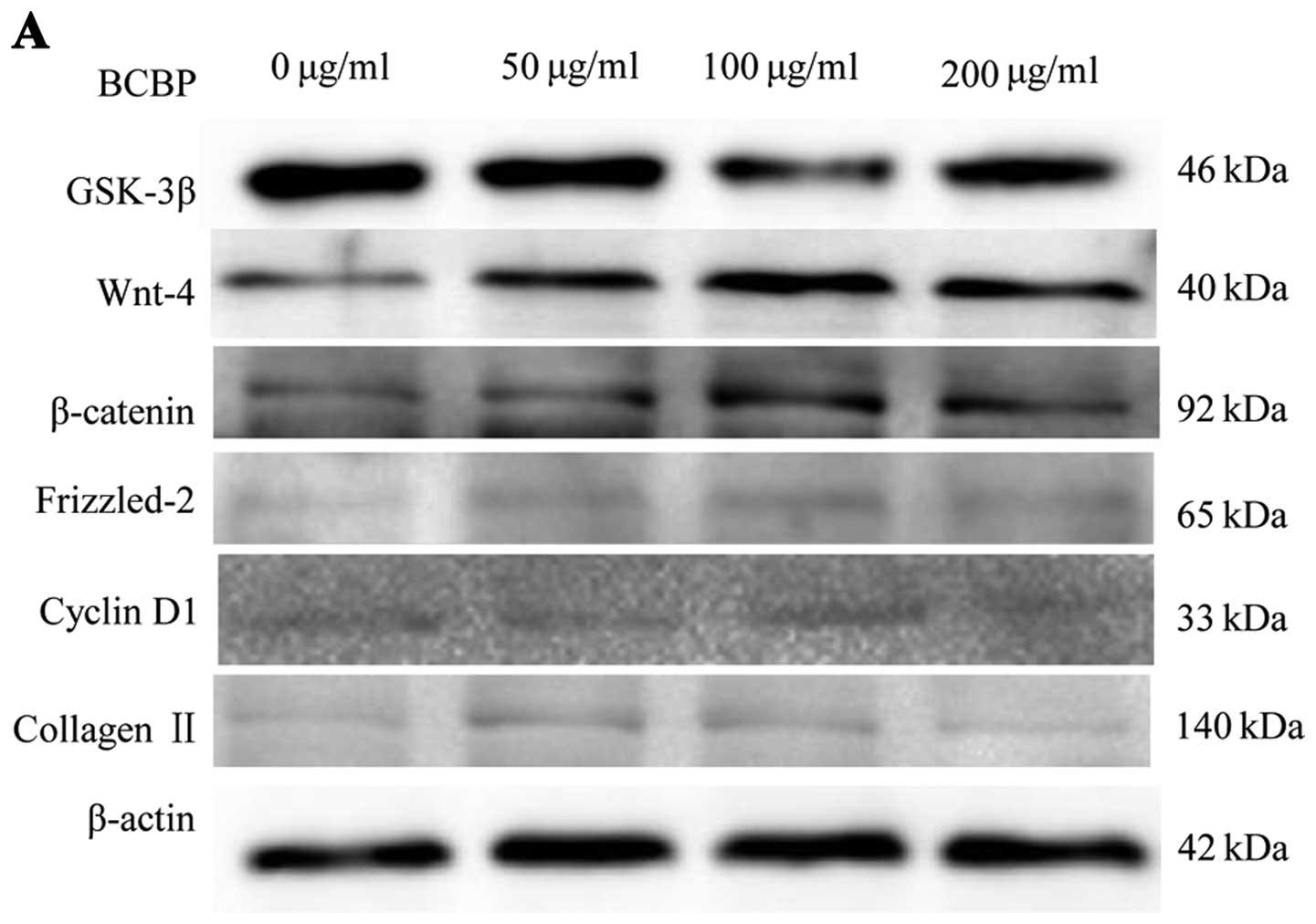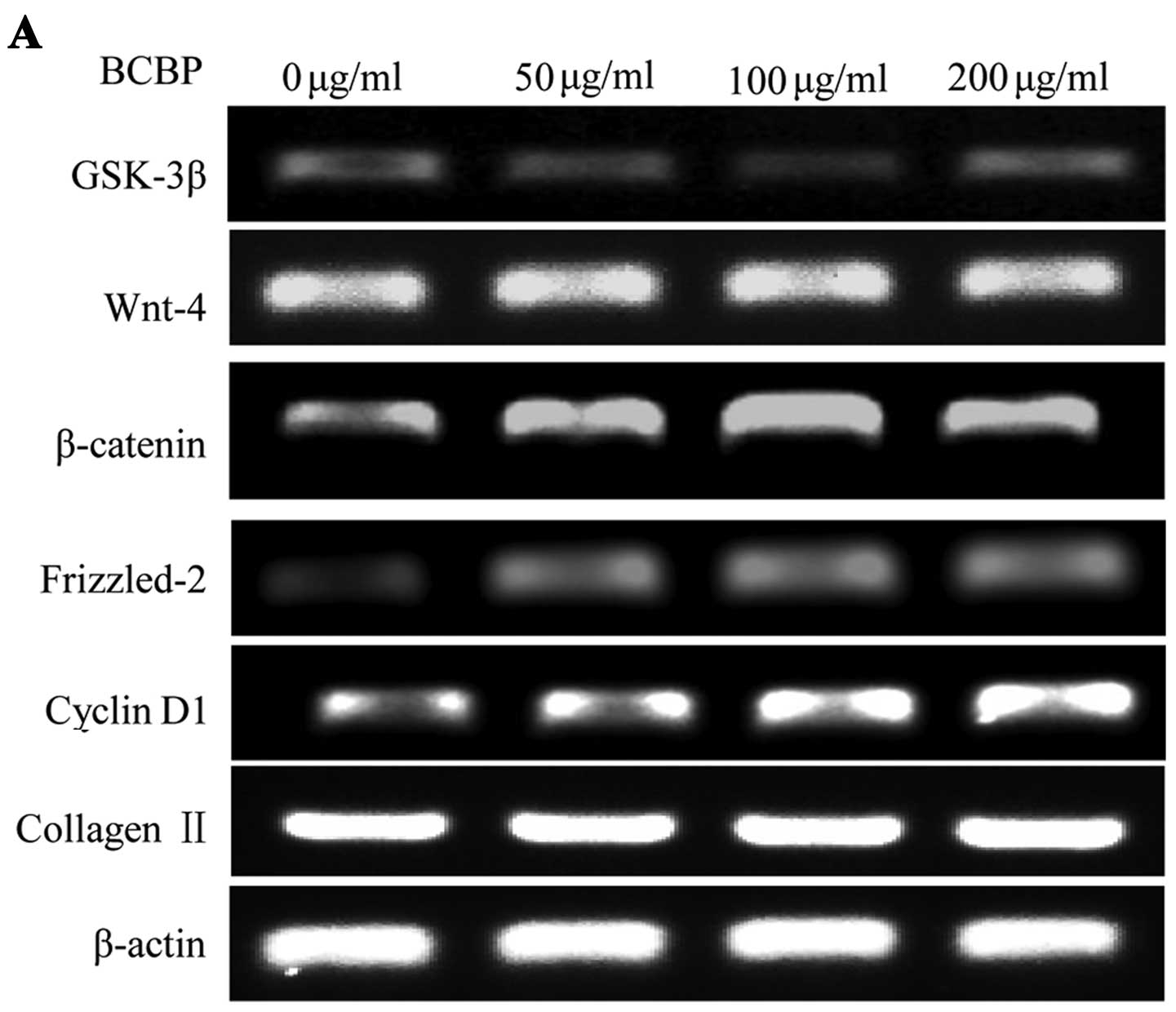|
1
|
Pitsillides AA and Beier F: Cartilage
biology in osteoarthritis-lessons from developmental biology. Nat
Rev Rheumatol. 7:654–663. 2011. View Article : Google Scholar : PubMed/NCBI
|
|
2
|
Wu Q, Zhu M, Rosier RN, Zuscik MJ, O’Keefe
RJ and Chen D: Beta-catenin, cartilage, and osteoarthritis. Ann N Y
Acad Sci. 1192:344–350. 2010.PubMed/NCBI
|
|
3
|
Tao HY, He B, Liu SQ, et al: Effect of
carboxymethylated chitosan on the biosynthesis of NGF and
activation of the Wnt/β-catenin signaling pathway in the
proliferation of Schwann cells. Eur J Pharmacol. 702:85–92.
2013.PubMed/NCBI
|
|
4
|
Lu W, Tinsley HN, Keeton A, Qu Z, Piazza
GA and Li Y: Suppression of Wnt/β-catenin signaling inhibits
prostate cancer cell proliferation. Eur J Pharmacol. 602:8–14.
2009.
|
|
5
|
Akiyama T: Wnt/β-catenin signaling.
Cytokine Growth Factor Rev. 11:273–282. 2000.
|
|
6
|
Li X, Peng J, Wu M, et al: BMP2 promotes
chondrocyte proliferation via the Wnt/β-catenin signaling pathway.
Mol Med Rep. 4:621–626. 2011.PubMed/NCBI
|
|
7
|
Blom AB, van Lent PL, van der Kraan PM and
van den Berg WB: To seek shelter from the Wnt in osteoarthritis?
Wnt-signaling as a target for osteoarthritis therapy. Curr Drug
Targets. 11:620–629. 2010. View Article : Google Scholar : PubMed/NCBI
|
|
8
|
Vlad-Fiegen A, Langerak A, Eberth S and
Müller O: The Wnt pathway destabilizes adherens junctions and
promotes cell migration via β-catenin and its target gene cyclin
D1. FEBS Open Bio. 2:26–31. 2012.PubMed/NCBI
|
|
9
|
Schepetkin IA and Quinn MT: Botanical
polysaccharides: Macrophage immunomodulation and therapeutic
potential. Int Immunopharmacol. 6:317–333. 2006. View Article : Google Scholar : PubMed/NCBI
|
|
10
|
Yu F, Li X, Cai L, et al: Achyranthes
bidentata polysaccharides induce chondrocyte proliferation via
the promotion of the G1/S cell cycle transition. Mol Med Rep.
7:935–940. 2013.
|
|
11
|
Gescher K and Deters AM: Typha
latifolia L. fruit polysaccharides induce the differentiation
and stimulate the proliferation of human keratinocytes in vitro. J
Ethnopharmacol. 137:352–358. 2011. View Article : Google Scholar
|
|
12
|
Liu H, Fan Y, Wang W, Liu N, Zhang H, Zhu
Z and Liu A: Polysaccharides from Lycium barbarum leaves:
isolation, characterization and splenocyte proliferation activity.
Int J Bio Macromol. 51:417–422. 2012.
|
|
13
|
Yao H, Chen Y, Li S, Huang L, Chen W and
Lin X: Promotion proliferation effect of a polysaccharide from
Aloe barbadensis Miller on human fibroblasts in vitro. Int J
BioMacromol. 45:152–156. 2009. View Article : Google Scholar : PubMed/NCBI
|
|
14
|
The Ministry of Science and Technology of
the People’s Republic of China. Guidance Suggestion for the Care
and Use of Laboratory Animals. 2006.
|
|
15
|
Sevag MG: A new physical de-proteination
method for representation of biologically effective
substances-isolation of carbohygrates in chicken-protein and
pneumococci. Biochemis Zeitschrift. 273:419–429. 1934.
|
|
16
|
Li X, Zhang H and Xu H: Analysis of
chemical components of shiitake polysaccharides and its
anti-fatigue effect under vibrational. Int J Bio Macromol.
45:377–380. 2009. View Article : Google Scholar : PubMed/NCBI
|
|
17
|
Yang Q, Wang S, Xie Y, Sun J and Wang J:
HPLC analysis of Ganoderma lucidum polysaccharides and its effect
on antioxidant enzymes activity and Bax, Bcl-2 expression. Int J
Biol Macromol. 46:167–172. 2010. View Article : Google Scholar : PubMed/NCBI
|
|
18
|
Li X, Du M, Liu X, Chen W, Wu M, Lin J and
Wu G: Milimeter wave treatment promote chondrocyte proliferation by
upregulating the expression of cyclin-dependent kinase 2 and cyclin
A. Int J Mol Med. 26:77–84. 2010.PubMed/NCBI
|
|
19
|
Cai L, Ye H, Yu F, Li H, Chen J and Liu X:
Effects of Bauhinia championii (Benth.) Benth
polysaccharides on the proliferation and cell cycle of
chondrocytes. Mol Med Rep. 7:1624–1630. 2013.
|
|
20
|
Hirsch C, Campano LM, Wöhrle S and Hecht
A: Canonical Wnt signaling transiently stimulates proliferation and
enhances neurogenesis in neonatal neural progenitor cultures. Exp
Cell Res. 313:572–587. 2007. View Article : Google Scholar
|
|
21
|
Chen Y, Guan Y, Liu H, et al: Activation
of the Wnt/β-catenin signaling pathway is associated with glial
proliferation in the adult spinal cord of ALS transgenic mice.
Biochem Biophys Res Commun. 420:397–403. 2012.
|
|
22
|
Kang K, Lee KM, Yoo JH, Lee HJ, Kim CY and
Nho CW: Dibenzocyclooctadie-ne lignans, gomisins J and N inhibit
the Wnt/β-catenin signaling pathway in HCT116 cells. Biochem
Biophys Res Commun. 428:285–291. 2012.PubMed/NCBI
|
|
23
|
Kitagaki J, Iwamoto M, Liu JG, Tamamura Y,
Pacifci M and Enomoto-lwamoto M: Activation of β-catenin -LEF/TCF
signal pathway in chondrocytes stimulates ectopic endochondral
ossification. Osteoarthritis Cartilage. 11:36–43. 2003.
|
|
24
|
Andrade AC, Nilsson O, Barnes KM and Baron
J: Wnt gene expression in the post-natal growth plate: regulation
with chondrocyte differentiation. Bone. 40:1361–1369. 2007.
View Article : Google Scholar : PubMed/NCBI
|
|
25
|
Van Vijven JP, Luijsterburq PA, Verhagen
AP, van Osch GJ, Kloppenburg M and Bierma-Zeinstra SM: Symptomatic
and chondroprotective treatment with collagen derivatives in
osteoarthritis: a systematic review. Osteoarthritis Cartilage.
20:809–821. 2012.PubMed/NCBI
|
|
26
|
Kang M, Junq I, Hur J, et al: The
analgesic and anti-inflammatory effect of WIN-34B, a new herbal
formula for osteoarthritis composed of Lonicera japonica
Thunb and Anemarrhena asphodeloides BUNGE in vivo. J
Ethnopharmacol. 131:485–496. 2010. View Article : Google Scholar : PubMed/NCBI
|
|
27
|
Chan BY, Fuller ES, Russell AK, et al:
Increased chondrocyte sclerostin may protect against cartilage
degradation in osteoarthritis. Osteoarthritis Cartilage.
19:874–885. 2011. View Article : Google Scholar : PubMed/NCBI
|
|
28
|
Huang JG, Xia C, Zheng XP, Yi TT, Wang XY,
Song G and Zhang B: 17β-Estradiol promotes cell proliferation in
rat osteoarthritis model chondrocytes via PI3K/Akt pathway. Cell
Mol Biol Lett. 16:564–575. 2011.
|
|
29
|
Wang C, Yuan X and Yang S: IFT80 is
essential for chondrocyte differentiation by regulating Hedgehog
and Wnt signaling pathways. Exp Cell Res. 319:623–632. 2013.
View Article : Google Scholar : PubMed/NCBI
|
|
30
|
Bueno MJ and Malumbres M: MicroRNAs and
the cell cycle. Biochim Biophys Acta. 1812:592–601. 2011.
View Article : Google Scholar : PubMed/NCBI
|















